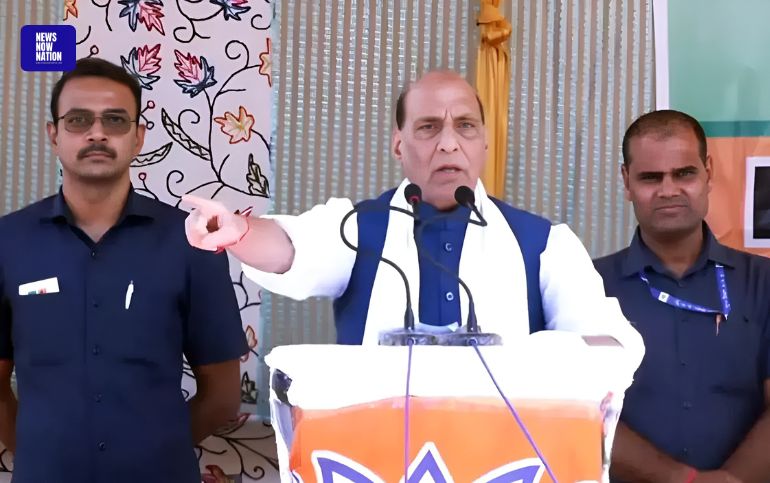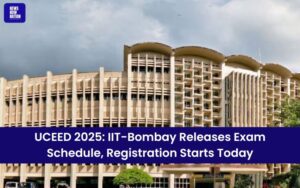
Defence Minister Rajnath Singh has strongly criticized Pakistan’s stance on Pakistan-occupied Kashmir (PoK), stating that while Pak calls PoK locals foreigners, India considers them as its own citizens. His remarks came during an election rally in the Ramban district of Jammu, where he outlined the contrasting approaches of India and Pakistan towards the people of PoK and Jammu & Kashmir (J&K).
Rajnath Singh’s Criticism of Pakistan’s PoK Policy
Addressing a large gathering, Rajnath Singh called out Pakistan for labeling the people of PoK as “foreigners” in a recent affidavit submitted by the Pakistan government. He remarked, “Pak calls PoK locals foreigners,” while India embraces them as its own. Singh reiterated that the people of Jammu & Kashmir are free citizens of India, and they have the right to peace, prosperity, and a dignified life. He highlighted that the residents of PoK are also Indians and should be welcomed as such once they rejoin the country.
Rajnath Singh went on to contrast India’s inclusive approach with Pakistan’s dismissive stance, underlining that India has always considered the people of PoK as integral to its sovereign territory. He said, “We don’t call them foreigners. They are our people. Let them come and join us.”
Reflection on the BJP-PDP Coalition
During his speech, Rajnath Singh also touched upon the BJP’s earlier alliance with the People’s Democratic Party (PDP) in Jammu & Kashmir. He pointed out that during the PDP-led government under Mehbooba Mufti, the BJP made efforts to bring peace to the region. They even withdrew cases against minors and innocents, he claimed. However, Singh criticized the PDP for being sympathetic toward separatists, which hindered efforts to stabilize the region. He emphasized that despite these challenges, the people of Jammu & Kashmir remained free citizens of India with the right to prosperity.
Criticism of Omar Abdullah’s Remarks on Afzal Guru
Rajnath Singh did not hold back in criticizing National Conference (NC) vice-president Omar Abdullah for his remarks regarding Afzal Guru, the 2001 Parliament attack convict who was hanged in 2013. Singh took a sharp dig at Abdullah, asking, “Did he want Afzal Guru to be garlanded?” Singh’s comments were aimed at stirring public sentiment against the NC’s perceived soft stance on terrorism and separatism in the region.
BJP’s Vision for Jammu & Kashmir
Rajnath Singh also spoke about the BJP’s long-term vision for Jammu & Kashmir, should the party form the government in the state. He claimed that if given a chance to rule for 10 years, the BJP would transform Jammu & Kashmir into one of the most prosperous regions in India.
The Union Minister further emphasized the current political climate in Jammu & Kashmir, claiming that support for the BJP is stronger than ever. He pointed to the increased voter turnout during recent elections, with 58% participation in the Lok Sabha elections and a record 72% in Ladakh.
“First time, there was an election here which was held without fear and without any partisan consideration,” Singh noted, emphasizing that BJP’s governance has created a safe and conducive political atmosphere in the region.
India’s Economic Progress and Jammu & Kashmir’s Future
Linking the future of Jammu & Kashmir to India’s overall economic growth, Rajnath Singh highlighted the country’s remarkable progress under Prime Minister Narendra Modi’s leadership. He pointed out that India has risen from the 11th to the 5th largest economy globally, and independent surveys predict that India will soon become the 3rd largest economy in the world, behind the US and China.
Singh promised that with the BJP at the helm in Jammu & Kashmir, the region would benefit from this economic growth. He cited the development projects already underway, including the construction of a railway link and reducing travel time from Jammu to Srinagar. These projects, valued at Rs 38,000 crore, are part of the government’s broader initiative to boost infrastructure and economic development in the state.
Abrogation of Article 370 and Security in the Valley
Rajnath Singh also highlighted the abrogation of Article 370 as a significant milestone in Jammu & Kashmir’s journey towards peace and development. He criticized the National Conference’s manifesto that promises to restore Article 370, asserting, “Nobody can restore 370 now.” He underscored that the abrogation was widely accepted, and no significant resistance emerged against the decision.
Singh praised the return of peace in the Kashmir Valley, where incidents like stone-pelting and terror activities have drastically reduced. He pointed to the first-ever G-20 meeting in Kashmir as a symbol of the improved security situation. “Kashmir was called a terrorism spot, but now it is called a tourism spot,” he remarked, underscoring the success of BJP’s governance in bringing about this transformation.
Promises for Future Development
In addition to highlighting past achievements, Rajnath Singh made several promises aimed at boosting the BJP’s chances in the upcoming elections. He pledged that the incomplete border fencing would be completed, two free gas cylinders would be provided to families of weaker sections, and students in remote areas would receive free tablets and laptops. He also mentioned plans for developing tourist destinations in Ramban and Banihal and the introduction of metro services in Jammu and Srinagar.
The Minister emphasized the BJP’s commitment to empowering marginalized communities, including West Pakistan refugees, Safai Karamcharis, and the Valmiki Samaj, ensuring that they would have the right to vote in future Assembly elections.
Conclusion
As the election in Jammu & Kashmir draws closer, Rajnath Singh’s rally and his remarks about how Pak calls PoK locals foreigners resonate with the BJP’s broader narrative of national unity and development. His speech served not only to criticize Pakistan’s policies but also to highlight the successes of the BJP in bringing peace, security, and development to Jammu & Kashmir.
By focusing on how India treats all Kashmiris, including those in PoK, as its own citizens, the BJP aims to strengthen its electoral standing in the region. The upcoming Assembly elections, spread across three phases in September and October, will be crucial in determining the political future of Jammu & Kashmir.
Stay tuned to News Now Nation for updates and more news.
Follow us on social media for real-time news updates:






